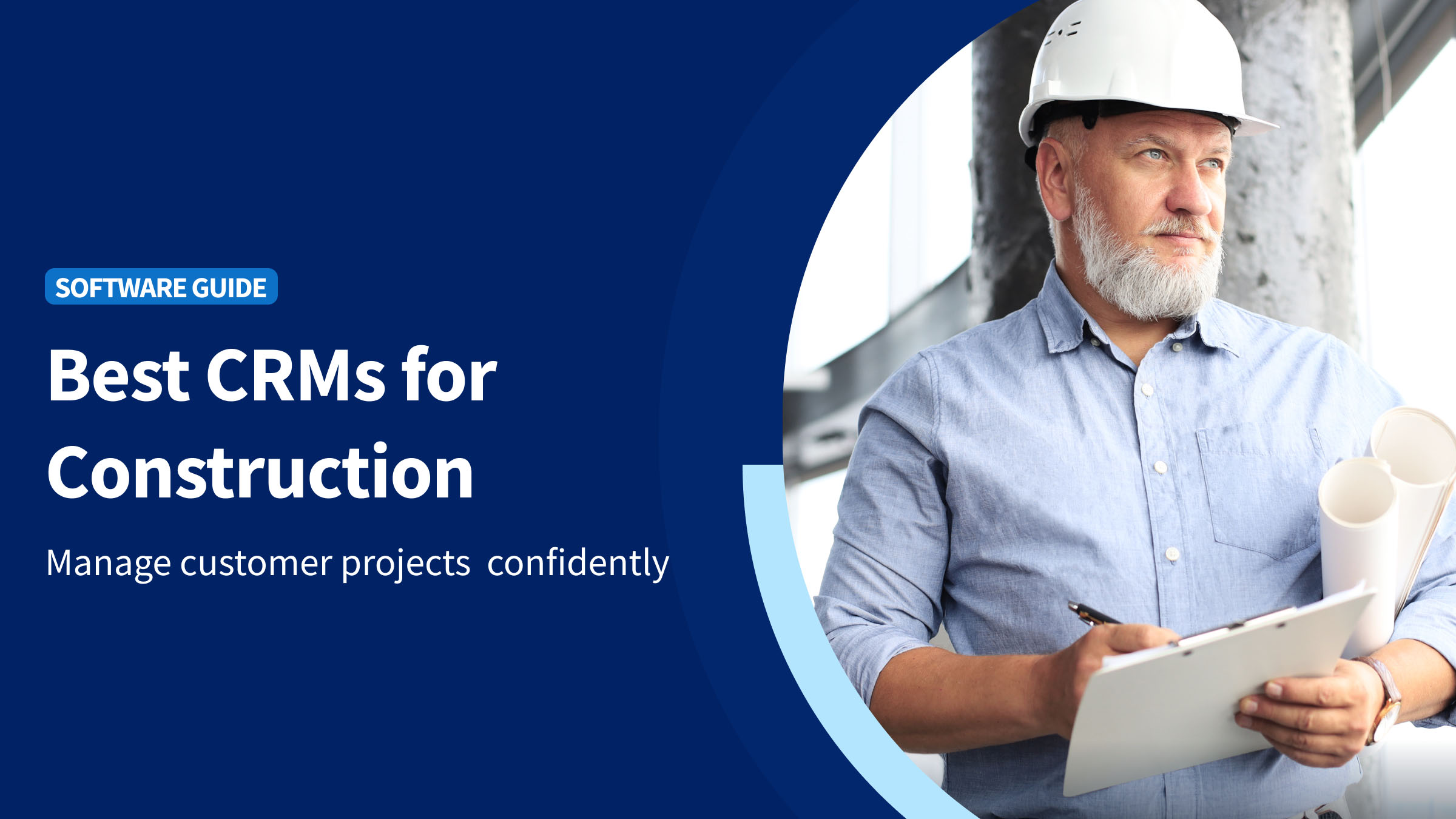Making an estimate is the first step in every construction project. A request for an estimate represents a lead’s interest in your services and brings you one step closer to conversion.
However, the most important part of an estimate is its accuracy. While the point of an estimate is to give only a prediction of final job costs, appraising construction costs as accurately as possible benefits both you and your customers.
But gauging costs and projecting profits accurately is harder than it sounds.
So, how do you go about estimating construction costs and formulating a cost plan effectively? Keep reading to find out.
What are construction costs?
Construction costs are any costs associated with a construction project.
When a potential customer approaches you for an estimate, they expect you to estimate construction costs. It’s essential that your estimate contains correct and precise information to start off the job on the right foot.
Why are accurate estimations important?
Estimating construction costs as accurately as possible should be a top priority for your business as it benefits everyone involved.
You rely on your estimate to complete the job. Likewise, your customer will depend on the estimate as a guide throughout the job.
Drafting a preliminary budget and performing a cost evaluation on any given project ensures that every job you take on is achievable and profitable. Budgeting carefully and measuring your estimates through the lens of that budget ensures financial success on every project. This way, you stay confident that you’re allocating your resources effectively.
When your original estimate matches your costs, you avoid surprises. When comparing these two numbers, an inaccurate estimate throws off your predicted construction costs and can cause delays and financial problems. Judging from past experiences, it will seriously impact your revenue if you’ve estimated much higher than the final cost of the job.
What’s more, if the final project ends up costing way more than the estimate, chances are that you end up with an unhappy customer. Reckoning cost overruns is much harder than avoiding them in the first place. So, a more accurate estimate now means less problems later — and stronger customer relationships that lead to more business down the road.
Now that you know the importance of creating accurate estimates, let’s look at the factors to consider when estimating construction costs.
Factors that impact construction costs
Estimating construction costs requires you to consider a series of factors. When determining what to include in your estimates, here are some factors you must consider:
Material costs for the project
When preparing a cost breakdown, you should provide an estimate of material costs based on the job details and the price of materials at the time.
Material costs should be noted as per item and include the estimated number of items needed to complete the job. Enumerating your items properly and counting out their quantities reduces your chances of underestimating a project’s total cost.
Labor costs
Similar to material costs, labor costs should be based on the estimated number of hours it will take to complete the job.
Completing a cost appraisal for labor comes with experience and the knowledge of how long a certain job takes to complete. The more experienced you are, the less hours you’ll need to complete a job.
What’s more, if you have a team of employees or subcontractors, you’ll have to estimate the labor costs for each individual.
Equipment costs
Equipment costs include both equipment that you own and equipment that you have to rent for the job.
Quantifying the cost of equipment you own is a bit trickier. In this case, you should estimate costs around the usage and labor costs it takes to operate.
It’s simpler to estimate the cost of equipment that you rent, as the place you rent it from will likely provide you with an hourly or daily rate.
Overhead and indirect costs
Overhead and indirect costs are easy to forget, but not figuring them in can lead to a loss for your business.
- Marketing costs.
- Transportation costs.
- Insurance.
- Permits.
When calculating the total amount due, it’s important to add a markup in your estimate for these costs to ensure profit.
Unexpected/unforeseen costs
As nice as it would be for every job to go as planned, if you’re an experienced contractor, you know that’s not how the world works.
You should always leave a cushion for unexpected costs. Otherwise, when things don’t go as planned, it’s either the customer pays or you do. Regardless, your business loses. Conducting a financial assessment of your business will help you prepare for unexpected costs.
Location and complexity of the project
Finally, when estimating construction costs, you have to have a good idea of how complex the project will be and if there are any specifications on the job site to consider.
While this isn’t a line item in your estimate, you should consider how complex the project is throughout preparation. Commercial renovations costs are generally more than simple residential remodel costs.
Likewise, the location of the job affects factors such as transportation, especially if it’s difficult to access.
Types of construction cost estimates with a construction cost estimator
There are two main ways to approach estimating construction costs: create a conceptual estimate or a detailed estimate.
Both involve creating a cost forecast but tackle it differently. Let’s take a look at what each option involves.
Conceptual estimate
A conceptual estimate is done at the early stages of a project.
These estimates are created early in the planning process and are often done to see if a project is even feasible.
The benefit of conceptual estimates is that they require less work and give your customer a good idea of what is and isn’t possible. They’re especially useful for large complex projects that require a lot of planning, as they’re great for quickly establishing a cost baseline and providing a ballpark figure to potential customers before you begin any work.
Instead of carrying out a cost analysis as in-depth as possible, conceptual estimates are more about summarizing the job and running a cost estimate that is much more volatile.
However, these estimates will not be as accurate as detailed estimates, which should still be done later on in the process.
Detailed estimates
You can make a detailed estimate when there’s enough information about the project to predict the potential outcome. These estimates include information on the job such as:
- Quantities.
- Costs.
- Rates.
- Materials.
Weighing detailed estimates against conceptual estimates, the former is more prevalent due its usefulness. Not every job requires a conceptual estimate, but a detailed estimate is always necessary.
Now, let’s discuss the different ways that you can estimate construction costs.
Methods of estimating construction costs
Every business will have their own method of estimating construction costs. What’s important is that you have a consistent strategy when drawing up a cost schedule to ensure you’re giving every potential customer the most accurate estimates possible.
There are two standard ways to estimate costs and price a job as a contractor: by average industry price or by historical costs.
Average industry pricing
Developing a price structure based on average price in the industry is the most effective way to come to accurate totals.
The construction industry is ever-changing. Making a cost projection on what’s trending at the moment, you ensure up-to-date pricing that results in more accurate estimates.
Using this method requires you to always stay on top of industry changes. But doing so benefits your business in other ways too, such as in forming new business strategies.
Historical cost estimates
Some people prefer generating a cost calculation based on historical data. Sometimes, this is the easiest way to approach estimates, especially when you’re doing two identical jobs back to back.
The drawback is that your estimates may end up being less accurate over time. As mentioned, the construction industry is always changing, so today’s price might not be tomorrow’s. This makes forecasting and predicting trends difficult.
If you choose to go the historic costs route, researching industry pricing from time to time and adjusting numbers to confirm your estimate’s accuracy is necessary.
No matter which method you choose, there’s one secret to increasing the accuracy of your estimates while decreasing the time you spend creating them: automation.
How to automate your way to stress-free estimates
There are several ways to automate your estimating process.
The first way is to use an estimate template. A template saves you from creating an estimate from scratch with each job and provides fields for everything you need to estimate, meaning that itemizing and tabulating your data is a breeze.
Your other option is to automate your estimate process using software. This saves you time and stress from beginning to end.
The best software allows you to estimate construction costs quickly and accurately. You can create and send estimates in just a few clicks with features such as:
- Email integrations.
- Estimate-to-invoice conversion.
- Data analytics.
For example, Method automates your estimate and invoice processes to focus on business growth. Users love it for its automation options and impressive functionality with popular platforms. Not to mention, its mobile application (for iOS and Android) lets users do it all on the go.
Key takeaways
Accurately estimating construction costs leads to better reviews and savings for your business — that’s a win-win.
While the skill of creating accurate estimates develops with experience, knowing the ins and outs of the estimating process lets you determine a method that works best for you.
Reviewing your estimating strategy every few months is also key; regularly assessing your prices and benchmarking them ensures that you’re keeping up with your competition and industry standards.
Estimating construction costs FAQs
What costs should a constructor cost estimator consider?
Construction managers should consider the following costs when creating estimates:
- Size of the job,
- Location of the job.
- Labor, including subcontractors.
- Length to complete the job.
Each of these factors affects the final estimated cost.
What is the function of a cost estimator in construction?
A cost estimator in construction is meant to predict the potential cost of a job.
While contractors are not bound to their cost estimates, it’s in the interest of both parties to have the final cost of the job be as close as possible to the estimated cost after sizing up a job.
Is construction estimating difficult?
Estimating construction costs can be difficult, especially for those just starting out. After all, accuracy is the most difficult part of the estimating process.
However, with experience, analyzing and evaluating jobs becomes easier. You learn and gain confidence with each new job!
Want to automate your estimating process? See how Method can help with this free demo.
Image credit: Mikhail Nilov via Pexels






